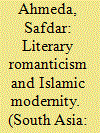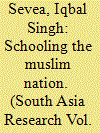| Srl | Item |
| 1 |
ID:
114018


|
|
|
|
|
| Publication |
2012.
|
| Summary/Abstract |
In the nineteenth century, Muslim modernist reformers sought to ground an agenda for social and political rejuvenation in a return to the spirit of the early Muslim community. However, the influence of this quest for communal regeneration on theological discourses was, in some cases, less notable than its influence upon projects for cultural and social reform. One area of focus for Indian modernists of the nineteenth century was literature and the literary arts, including poetry, which were now deemed relevant to notions of cultural health, authenticity and decline. Under the dictum that a people's condition is reflected in their language, the themes of moral degeneration and reform came to have a strong bearing on the indigenous valuation of poetry and the literary arts, challenging the criteria upon which such literature was judged. In this paper, I will analyse how the modernist agenda for social reform led to the birth of a new literary romanticism in Urdu poetry.
|
|
|
|
|
|
|
|
|
|
|
|
|
|
|
|
| 2 |
ID:
103689


|
|
|
|
|
| Publication |
2011.
|
| Summary/Abstract |
This article examines Muhammad Iqbal's critique of contemporary approaches towards Muslim education. In his writings, poetic and prose, Iqbal took on both the traditional religious authorities who administered the Madrasas and the modernists associated with the Aligarh College for failing to provide an education that was true to the 'national character' and to develop a synthesis of Islamic and western knowledge. While the former were criticised for ignoring modern intellectual developments, the latter were attacked for being intellectually captive to the West. At a broader level, this article employs Iqbal as a foil to debates over the empowering potential of western education. Iqbal's views are examined against the background of attempts by Muslim intel-lectuals to negotiate between the adoption of a universal modern education and the development of an educational system that kept Muslims grounded in Islam and their 'national character'. These negotiations took on a number of shapes, pedagogical and polemical as well as theological.
|
|
|
|
|
|
|
|
|
|
|
|
|
|
|
|